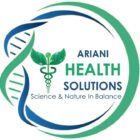A string of pearls: Polycystic Ovarian Syndrome (PCOS)
A Natural Approach to PCOS
Written by Anri van der Merwe (Physiologist and Fitness Specialist)
PCOS (Polycystic Ovarian Syndrome) or PCOD (Polycystic Ovarian Disease) is a common endocrine system disorder among women of reproductive age, affecting 5-10% of women.
PCOS involves irregular ovulation in combination with excess male hormones (androgens) and possibly polycystic (many cysts) ovaries. The cysts looks like little pearls on the ovaries (as seen on an ultrasound), causing hormone imbalances.
Cyst formation
Under normal circumstances the ovary produces a follicle, containing an egg or ovum; the follicle bursts open and releases one egg every month, when maturity is reached. The egg then travels to the uterus for fertilisation.
In PCOS, immature follicles clump together and never burst open to release the egg. This leads to cyst formation.
Symptoms
PCOS is a syndrome and therefore indicates ‘a group or collection of signs and symptoms’. Due to the inconsistency in the signs and symptoms, it can be very difficult to diagnose and define PCOS. The symptoms differ among individuals and not all women diagnosed with PCOS, experience all of the symptoms.
Symptoms include the following:
- No, or irregular (infrequent) or prolonged and heavy, periods
- Acne
- Excess hair growth on the body and face due to excess male hormones (androgens)
- Overweight or obesity; especially around the waist.
- Weight gain is generally caused due to carbohydrate cravings and increased appetite as well as lack of physical activity. Depression, anxiety and eating for comfort, can also lead to weight gain.
- Thinning hair on the scalp
- Acanthosis nigricans – darker skin patches in folds of the neck, waist, armpits or groin
- Anovulation (not ovulating)
- Fertility problems
- Depression
Many women with PCOS have a family history of diabetes, insulin resistance or androgen excess in the family. Women with PCOS also have a greater risk of developing type 2 diabetes mellitus (DM), hypertension, abnormal lipid (fat) levels and cardiovascular disease.
Causes
The exact cause of PCOS is unknown. Early diagnosis and treatment along with weight loss, may reduce the risk of long-term complications, such as type 2 diabetes and heart disease.
There is a connection between body weight and the severity of the condition. PCOS is also related to insulin resistance: 30-40% of women with the condition have pre-diabetes (might develop into diabetes later on). Androgen (e.g. testosterone) production may increase inside the ovaries, due to overexposure to insulin. This in turn upsets the sensitive hormonal balance in the ovaries that is necessary to prepare an egg for ovulation and fertilisation.
Diagnosis
PCOS is very difficult to diagnose as the symptoms may mimic many other abnormalities. Your doctor must rule out adrenal gland disorders, thyroid problems, anovulation and early menopause. Blood tests are necessary to determine hormone levels incl. insulin and glucose levels. An ultrasound is also necessary to determine if cysts are present. One or two cysts does not necessarily mean that you have PCOS.
Treatment
- Lifestyle changes
Dr Trudy Smith (Gynaecologist) states: ‘If you lose weight you can improve, if not reverse, your PCOS’. Weight loss also improves cardiovascular disease risk, menstruation irregularities, ovulation and fertility.
- Diet (click here for more information)
- Low carbohydrate diet for weight loss. Carbs is like poison for women with PCOS, but most women with PCOS crave carbs!
- Lots of vegetables, fruit and whole grains as low GI carbs decreases insulin spikes and control cravings
- Oils like olive oil, avocado oil, coconut oil (for cooking especially) as it stimulates the thyroid gland and aids in weight loss.
- Essential fatty acids like omega 3 from oily fish is crucial to improve insulin sensitivity and lowers cardiovascular disease risk.
- Lean proteins
- Water: drink 1x 250ml water per 10kg of body weight
- Exercise (click here for more information)
- Increased physical activity for weight loss
- Incorporate interval training (for fat loss) and strength training (for building muscle mass) into your routine. Both are essential for fat loss and increasing muscle mass. Muscle is extremely active and burns calories throughout the day, even if you are not exercising. Therefore muscle=fat loss. For more info click here.
- Supplements/ Nutriceuticals:
- Female Balance can improve symptoms of PCOS, by regulating menstrual cycles, suppressing androgen (male hormone) secretion and clearing acne. Female balance is safe to use even if a woman wants to fall pregnant, it will actually assist and support fertility as it contains herbs, vitamins and minerals that are essential for the female reproductive system.
- GlucoseSUPPORT is a herbal remedy that contains specific herbs that control blood sugar and insulin levels.
- A natural appetite suppressant can also be used to curb carbohydrate cravings and to control appetite. Appetrol is an appetite suppressant that contain Garcinia cambogia that assists the body to release fat by increasing muscle mass and decreasing fat mass
Associated Health Risks
- If not treated, PCOS can cause endometrial hyperplasia (precancerous endometrium) that may lead to endometrial cancer
- Increased risk of infertility
- Associated with miscarriages
- Prevalence of gestational (during pregnancy) diabetes is higher
- Associated with type 2 diabetes mellitus, atherosclerosis, hypertension and cardiovascular disease
- Associated with high triglyceride levels and low levels of HDL (the good cholesterol)
References

